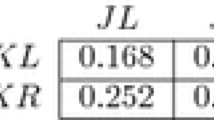Abstract
We define and characterize the notion of strong robustness to incomplete information, whereby a Nash equilibrium in a game \(\mathbf{u}\) is strongly robust if, given that each player knows that his payoffs are those in \(\mathbf{u}\) with high probability, all Bayesian–Nash equilibria in the corresponding incomplete-information game are close—in terms of action distribution—to that equilibrium of \(\mathbf{u}\). We prove, under some continuity requirements on payoffs, that a Nash equilibrium is strongly robust if and only if it is the unique correlated equilibrium. We then review and extend the conditions that guarantee the existence of a unique correlated equilibrium in games with a continuum of actions. The existence of a strongly robust Nash equilibrium is thereby established for several domains of games, including those that arise in economic environments as diverse as Tullock contests, all-pay auctions, Cournot and Bertrand competitions, network games, patent races, voting problems and location games.
Similar content being viewed by others
References
Amir, R.: Cournot oligopoly and the theory of supermodular games. Games Econ. Behav. 15, 132–148 (1996)
Aumann, R.J.: Subjectivity and correlation in randomized strategies. J. Math. Econ. 1, 67–96 (1974)
Ballester, C., Calvó-Armengol, A., Zenou, Y.: Who’s who in networks. Wanted: the key player. Econometrica 74, 1403–1417 (2006)
Baye, M.R., Hoppe, H.C.: The strategic equivalence of rent-seeking, innovation, and patent-race games. Games Econ. Behav. 44, 217–226 (2003)
Ben-Porat, O., Tennenholtz, M.: Multi-unit facility location games. In: WINE 2016: The 12th Conference on Web and Internet Economics (2016)
Bertsekas, D.P., Shreve, S.E.: Stochastic Optimal Control: The Discrete Time Case. Athena Scientific, New York (2004)
Borkar, V.S.: Probability Theory: An Advanced Course. Springer, Berlin (1995)
Bramoullé, Y., Kranton, R., D’Amours, M.: Strategic interaction and networks. Am. Econ. Rev. 104, 898–930 (2014)
Carlsson, H., van Damme, E.: Global games and equilibrium selection. Econometrica 61, 989–1018 (1993)
Dasgupta, P., Maskin, E.: The existence of equilibrium in discontinuous economic games, Part I (theory). Rev. Econ. Stud. 53, 1–26 (1986)
Dasgupta, P., Stiglitz, J.: Uncertainty, industrial structure, and the speed of R&D. Bell J. Econ. 11, 1–28 (1980)
Dekel, E., Fudenberg, D.: Rational behavior with payoff uncertainty. J. Econ. Theory 52, 243–267 (1990)
Dixit, A.: Strategic behavior in contests. Am. Econ. Rev. 77, 891–898 (1987)
Dütting, P., Kesselheim, T., Tardos, É.: Mechanism with unique learnable equilibria. In: Proceedings of the Fifteenth ACM Conference on Economics and Computation—EC’14, pp. 877–894. ACM Press, New York (2014)
Even-dar, E., Mansour, Y., Nadav, U.: On the convergence of regret minimization dynamics in concave games. In: Proceedings of the 41st Annual ACM Symposium on Theory of Computing—STOC’09, pp. 523–532. ACM Press, New York (2009)
Ewerhart, C., Quartieri, F.: Unique equilibrium in contests with incomplete information. Econ. Theory 70, 243–271 (2020)
Foster, D.P., Vohra, R.V.: Calibrated learning and correlated equilibrium. Games Econ. Behav. 21, 40–55 (1997)
Fudenberg, D., Kreps, D.M., Levine, D.K.: On the robustness of equilibrium refinements. J. Econ. Theory 44, 354–380 (1988)
Gale, D., Klee, V., Rockafellar, R.T.: Convex functions on convex polytopes. Proc. Am. Math. Soc. 19, 867–873 (1968)
Goodman, J.C.: Note on existence and uniqueness of equilibrium points for concave N-Person games. Econometrica 48, 251–251 (1980)
Hart, S., Mas-Colell, A.: A simple adaptive procedure leading to correlated equilibrium. Econometrica 68, 1127–1150 (2000)
Hart, S., Mas-Colell, A.: Markets, correlation, and regret-matching. Games Econ. Behav. 93, 42–58 (2015)
Hart, S., Schmeidler, D.: Existence of correlated equilibria. Math. Oper. Res. 14, 18–25 (1989)
Hillman, A.L., Riley, J.G.: Politically contestable rents and transfers. Econ. Polit. 1, 17–39 (1989)
Hotelling, H.: Stability in competition. Econ. J. 39, 41 (1929)
Kajii, A., Morris, S.: The robustness of equilibria to incomplete information. Econometrica 65, 1283–1309 (1997)
Liu, L.: Correlated equilibrium of Cournot oligopoly competition. J. Econ. Theory 68, 544–548 (1996)
Loury, G.C.: Market structure and innovation. Q. J. Econ. 93, 395 (1979)
Milgrom, P.R., Roberts, J.: Rationalizability, learning, and equilibrium in games with strategic complementarities. Econometrica 58, 1255–1277 (1990)
Milgrom, P., Shannon, C.: Monotone comparative statics. Econometrica 62, 157 (1994)
Monderer, D., Shapley, L.S.: Potential games. Games Econ. Behav. 14, 124–143 (1996)
Neyman, A.: Correlated equilibrium and potential games. Int. J. Game Theory 26, 223–227 (1997)
Papadimitriou, C.H., Roughgarden, T.: Computing correlated equilibria in multi-player games. J. ACM 55, 1–29 (2008)
Pavlov, G.: Correlated Equilibria and Communication Equilibria in All-Pay Auctions. Research Report # 2013-2 of Western University (2013). https://ir.lib.uwo.ca/cgi/viewcontent.cgi?article=1255&context=economicsresrpt
Persson, T., Tabellini, G.E.: Political Economics: Explaining Economic Policy. MIT Press, Cambridge (2000)
Reny, P.J.: On the existence of pure and mixed strategy Nash equilibria in discontinuous games. Econometrica 67, 1029–1056 (1999)
Rosen, J.B.: Existence and uniqueness of equilibrium points for concave N-Person games. Econometrica 33, 520–534 (1965)
Skaperdas, S.: Contest success functions. Econ Theory 7, 283–290 (1996)
Szidarovszky, F., Okuguchi, K.: On the existence and uniqueness of pure Nash equilibrium in rent-seeking games. Games Econ. Behav. 18, 135–140 (1997)
Tullock, G.: Efficient rent seeking. In: Efficient Rent-Seeking, pp. 3–16. Springer, Boston (2001)
Ui, T.: Correlated equilibrium and concave games. Int. J. Game Theory 37, 1–13 (2008)
Ui, T.: Bayesian Nash equilibrium and variational inequalities. J. Math. Econ. 63, 139–146 (2016)
Viossat, Y.: Is having a unique equilibrium robust? J. Math. Econ. 44, 1152–1160 (2008)
Author information
Authors and Affiliations
Corresponding author
Additional information
Publisher's Note
Springer Nature remains neutral with regard to jurisdictional claims in published maps and institutional affiliations.
The authors wish to thank Eddie Dekel, Ehud Lehrer, Yehuda John Levy, Daisuke Oyama, David Schmeidler, Aner Sela, and the participants of SWET 2019 workshop held in Otaru, Japan, for their valuable comments. The authors’ special grattitude goes to Atsushi Kajii, whose encouragement to put the first basic ideas into writing led to this work.
Rights and permissions
About this article
Cite this article
Einy, E., Haimanko, O. & Lagziel, D. Strong robustness to incomplete information and the uniqueness of a correlated equilibrium. Econ Theory 73, 91–119 (2022). https://doi.org/10.1007/s00199-020-01327-4
Received:
Accepted:
Published:
Issue Date:
DOI: https://doi.org/10.1007/s00199-020-01327-4




